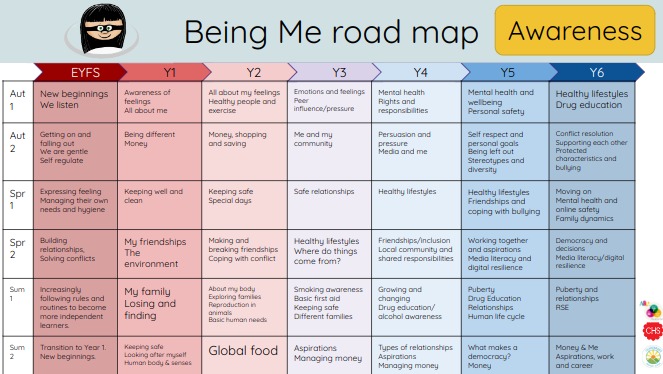- Home
- Teaching & Learning
- Curriculum Overview
- Subjects - The 3 I's
Subjects - The 3 I's
Writing
Intent
We aim to create a desire and passion within each child to express themselves through writing by providing them with a writing curriculum that is engaging, motivating and purposeful. As English has a pre-eminent place in education and in society, it is at the heart of all learning. We recognise that a good grasp of English allows children to access the whole curriculum. Therefore, the overarching aim of the writing curriculum is to equip children with a strong command of the written and spoken word.
We aim to:
- To enhance the sophistication of children’s writing through the development of a high level of vocabulary and literary devices.
- To teach children to be creative and enthusiastic writers who show confidence in a range of genres.
- To enrich the children’s experience of writing through exposure to a wide range of genres, including those reflective of theirs’ and others’ cultures.
- To teach children to show an awareness and sensitivity to the readers’ experience,
- To develop children's understanding of the importance of the composition and cohesion of writing.
Implementation
Through our 'Talk for Writing’ strategy across all phases within the school, children are initially given opportunities to develop their language skills orally, learning new and appropriate vocabulary and language features which are relevant to each genre. After practising them verbally, they then progress to using these skills in their writing. In addition, within this strategy, children learn specific grammatical features which enhance the quality and sophistication of their writing.
Children are also taught how to both plan and edit their writing to gain competence in structuring their work effectively. Lesson sequences focus on particular aspects of this process, e.g. planning a narrative, an informative text, a persuasive piece or revising a draft to change or improve it. Effective composition involves articulating and communicating ideas, which Talk for Writing supports and then organising them coherently for a reader.
In order to embed the application of all these skills, knowledge and understanding of writing learnt during their writing lessons, the children are also provided with opportunities to write in different contexts and for a variety of purposes in each subject across the curriculum.
Impact
Our writing curriculum will lead to children achieving the National Curriculum writing objectives which are expected of all children nationally. We aim for each child to be confident in each yearly objective and to build upon and develop their ability to use the required writing knowledge and skills as they progress through each school year. Each English lesson has a clear objective and set outcomes for pupils in terms of knowledge and understanding and skills acquisition. Lessons are differentiated to ensure that all children are challenged. By the time children leave CHC, they will be confident writers, able to express themselves articulately through cohesive pieces of writing for which they have used carefully chosen literary devices and have edited in order to ensure that they have produced a high quality piece of writing which they feel proud of.
We ensure that when assessing pupils, evidence is drawn from a wide range of sources to inform the process, including interaction with pupils during discussions and related questioning, day-to-day observations, role play drama, the gathering, presentation and communication of information and writing responses. The outcomes of each writing unit serve to inform the teacher’s developing picture of the knowledge and understanding of each pupil and to plan future learning accordingly. Outcomes are used to build an emerging picture of what the pupil knows, understands and can do.
At the end of each year, we make a summative judgement about the achievement of each pupil. At this point teachers decide whether the pupil has achieved and embedded the expected learning goals, exceeded expectations or is still working towards the goals. These decisions are based on the professional knowledge and judgement that teachers possess about the progress of each pupil, developed over the previous three terms, which allows an informed and holistic judgement of attainment to be made. Achievement against the writing curriculum objectives at the end of the year is used as the basis of reporting progress to parents.
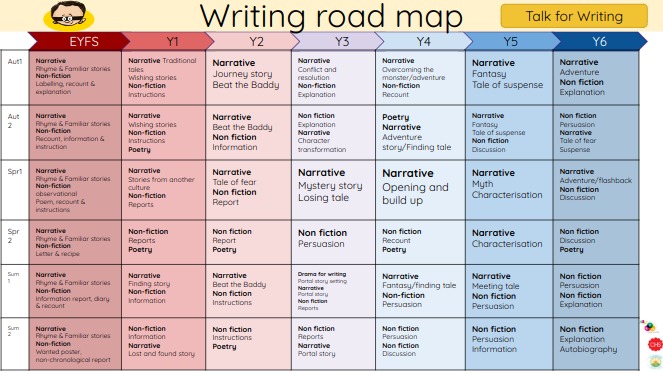
Reading
Intent
We expect our children to:
- Develop competence in the skills of speaking and listening, asking and responding to questions and participating in discussions
- Understand the meaning of what they read and what is read to them.
- Develop a lifelong enjoyment of reading, taking pleasure from what has been read
- Appreciate and value the rich and varied literary heritage from around the world
- Understand their reading levels and to be able to self-select appropriate texts.
- Read confidently and fluently and seek to acquire knowledge independently.
- Develop the reading skills they need to access all areas of the curriculum.
- Read critically to ascertain what the truth is in a statement so that they may gain a balanced understanding of local, national and international issues.
Implementation
We take a comprehensive approach to the teaching of reading through a range of strategies.
Regarding Phonics, children take part in a daily phonics lesson following the Read Write Inc. programme for teaching systematic synthetic phonics from Nursery until they have completed the programme. Older children who are new to English or need further support in their early language acquisition take part in the Fresh Start programme with Read, Write Inc. For more information about Phonics, please see the Phonics section on our website.
Children in Years 2-6 are taught reading through a systematic approach of whole class Guided Reading, which focuses on the skills of decoding and comprehension, as well as developing a love of reading. Reading is taught twice a week and each session is about 40 minutes in length. This approach has been developed further by introducing additional skills characters, with ten key skills being taught. For more information on specific reading skills, please refer to the Reading Policy. Teachers construct questions that encourage children to develop their understanding of the skill being taught, and children are taught how to use sentence stems to answer questions in full sentences.
Each child is given a Big Cat reading book to take home and read each week. In Reception and KS1 the books are matched to the phonic phase that the child is currently learning and to the letter sounds they already know. Children are encouraged to read with their parents for ten minutes each day, which is recorded in their Reading Records, and checked daily.
Every class has daily storytime, which is timetabled for the end of the school day. We have organised the storytime so that children read texts that will help them with their upcoming learning in the next term’s Talk for Writing scheme. Teachers also read short stories and poems with children, to develop a love of reading and expose children to a wide range of literature.
Each class has a well-stocked reading corner, with a range of high quality texts for children to read. We also make use of the Barnet Library boxes, including story sacks and Guided Reading sets, as well as non fiction books linking to the Creative Me topic that children are currently learning about.
Impact
Children become confident and fluent readers, who understand the importance of being able to read in order to learn, and who are passionate and enthusiastic about reading. They show that they are:
- Proud to be readers
- Eager to read
- Able to discuss books with each other
- Confident when reading aloud with an adult or in front of their peers
- Able to read a text and comprehend its meaning
- Able to use their reading skills to gain knowledge in all areas of the curriculum
- Aware of the different genres
- Reading for pleasure
- Developing awareness of a range of poetry
- Developing perspective of a range of authors
- Building a library of books and stories to take with them through their life
We know that children are achieving this through rigorous assessment. Teachers assess the children’s Big Cat book band level using the Running Records programme, which is heavily linked to their decoding ability. We complete this reading assessment every half term and progress is recorded on the Big Cat Reading Tracker Online. The teachers use the assessment programme to ascertain the childrens’ speed, accuracy, expression and understanding.
To assess the children’s comprehension ability, continual assessment for learning takes place during whole class reading sessions. Teachers monitor the children’s responses to questions during the teacher input and give feedback in the reading books during the lesson to help the child know what they are doing well and what they need to do to improve. The reading books are monitored by subject leaders termly and feedback is given to teachers to maintain high quality teaching and learning.
Every term, we carry out NTS reading assessments and record the scores on MARK. The results from these are used, alongside teacher judgement, to inform an up to date assessment for that checkpoint in the academic year. This is then recorded on the Class Assessment Tracker in school and on Scholarpack. MARK is also used to identify where the children have gaps in their knowledge, so that suitable planning and interventions can be put in place to support the children in making progress.
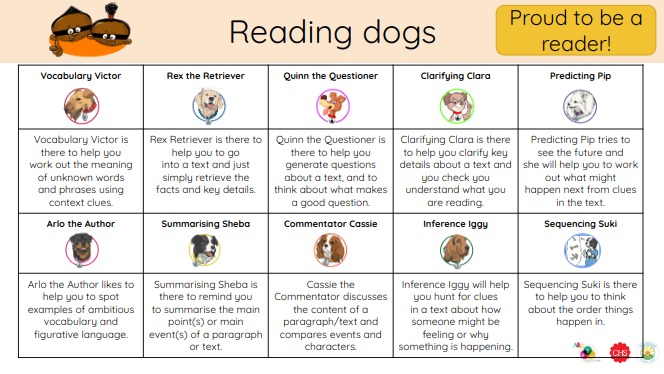
Phonics
Intent
At Claremont we believe passionately in ensuring all children become confident, fluent and enthusiastic readers. We believe that following the Read, Write, Inc (RWI) phonics programme provides the structure and support to make reading easier. Children learn to read fluently and at speed so they can focus on developing their skills in comprehension, vocabulary and spelling. Children progress through a series of reading books that are closely matched to their current phonics knowledge, enabling them to make the maximum amount of progress. All reading books progress cumulatively, matched to the sounds children are learning and already know.
Implementation
- In addition to Fred games, children in Nursery play speaking and listening games. In the summer term, the children are introduced to the letter sounds.
- Children continue to learn letter sounds and blending skills at the start of Reception, beginning with a daily 20 minute session learning a new sound each day
- Children from Year 1 to Y4 that are in the phonics program start their day with a 45 minute daily phonics lessons
- Each child has phonics resources shared with parents, and reading book that match what they are learning in school
- Children that require additional support are given daily tutoring sessions in addition to their phonics lesson to accelerate progress
- Fresh Start reading program is introduced in Year 5 and 6 for targeted children.
- Our staff are trained to deliver systematic and consistent structure to the lesson
Impact
Through the teaching of systematic phonics, our aim is for children to become fluent readers by the end of Key Stage 1. With decoding taught as the prime approach to reading, pupils will become familiar with this strategy and have the confidence to work out unfamiliar words in any new texts they encounter even when they have come to the end of the RWI programme. Pupils will have the opportunity to develop their fluency and comprehension as they move through the school; accessing a range of texts independently. Attainment in reading is measured using statutory assessments such as the end of EYFS, Key Stage 1 and 2 and following the outcomes in the Year 1 Phonics Screening check. Additionally, we track our own reading attainment through the use of RWI half termly and screening assessments, NFER reading papers and Comprehension Conversations plus ongoing teacher assessment. More importantly, we believe that reading is the key to unlock all learning and so the impact of our reading goes beyond the statutory assessments. We give all the children the opportunity to enter the amazing new worlds that a book opens up to them and share texts from a range of cultures or genres to inspire them to question or seek out more for themselves.
Maths
Intent
At Claremont we recognise that Mathematics is both a key skill within school, and a key life skill. Therefore we want our pupils to become:
- Fluent in the fundamentals of mathematics
- To reason and to solve problems confidently.
Our curriculum embraces the National Curriculum aims with the support of White Rose Maths.
Implementation
At Claremont, all learners are catered for fully in their daily mathematics lessons. Children study mathematics daily following the White Rose Maths Scheme of Learning. WRM is a blocked scheme, which allows for depth and breadth of learning within each strand of mathematics. To cater for our children it is intended to be used flexibly to meet the needs of our pupils and school community. Pupils who grasp concepts quickly are challenged through rich and sophisticated problems and those who are not sufficiently fluent with earlier material consolidate their understanding through additional practice, before moving on. Where necessary, accessing earlier material should consolidate their understanding, including through additional practice, before moving on.
We do this by focusing on:
Concrete, Pictorial and Abstract Learning: Children engage with a wide and varied range of concrete manipulatives, pictorial representations and abstract questions within each session. Cohesive and consistent use of CPA is a fundamental part of mastery in mathematics for all learners, not just those pupils with SEND. Concrete and pictorial references scaffold and strengthen understanding and are widely used as a teaching and learning tool from Foundation Stage to Year 6.
Fluency, Reasoning and Problem Solving: Every learning session includes the opportunity to develop fluency skills.
Mathematical Vocabulary: Sessions include explicit reference to vital mathematical vocabulary and the use of stem sentences to support and encourage all children to communicate their ideas clearly.
Impact
Our curriculum will lead to children meeting the standards of attainments across the school and those that are expected of our children nationally. We aim for each child to be confident in each yearly objective and develop their ability to use this knowledge to solve varied fluency problems as well as problem solving and reasoning questions. The implementation and impact of our Maths curriculum is assessed across school to ensure that children are provided with the best possible chance at succeeding. We strive to ensure that by the end of their time with us at Claremont each child will:
- Children demonstrate quick recall of facts and procedures. This includes the recollection of the times tables.
- The ability to recognise relationships and make connections in mathematics.
- Children show confidence in believing that they will achieve.
- Children show a high level of pride in the presentation and understanding of the work
- Children will deepen their Mathematical Understanding, year on year while also applying their Reasoning skills to understand the prevalence of Mathematics in ‘real-life’.
- Children at Claremont will grow in confidence to challenge themselves, they will embrace their mistakes and leave us as resilient Mathematicians.
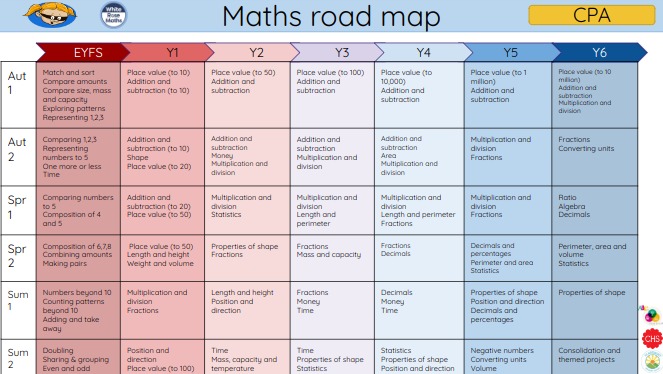
Science
Intent
At Claremont our vision is to give children a broad and balanced Science curriculum which enables them to confidently explore and discover the world around them, allowing them to acquire a deeper understanding of the world we live in through self-led practical activities. The golden thread of our Science curriculum is Discovery. To achieve this, our lessons involve exciting, practical hands-on experiences that encourage curiosity and questioning. By exposing children to local resources we hope to stimulate their natural curiosity whilst delivering a fun, practical and engaging high-quality curriculum.
We believe that Science encompasses the acquisition of knowledge, concepts, skills and positive attitudes. The children will acquire and develop the key knowledge that has been identified within each unit and across each year group, as well as the application of scientific skills.
Implementation
The acquisition of key scientific knowledge is an integral part of our science lessons. Each year group will begin their topic with an inquiry lesson to inspire and pique their curiosity. They will build upon the learning from prior years by recapping previous learning therefore developing depth of understanding and progression of skills. They will also have the opportunity to share what they already know about a current topic. The progression of skills for working scientifically are developed through the year groups and scientific enquiry skills are of key importance within lessons. Children explore, question, predict, plan, carry out investigations and observations as well as conclude their findings.
In order to immerse the children, we spend three full afternoons a week for a half term on Science. Additionally, Science is taught as a secondary subject in other half terms to ensure we cover all the National Curriculum objectives. During National Science week, we spend the week focusing on the Working Scientifically skills with children investigating a Science/STEM question or topic. Effective use of educational visits and visitors are planned, to enrich and enhance the pupil’s learning experiences within the Science curriculum.
We develop the children’s Scientific vocabulary by highlighting and discussing new words in lessons as well as reinforcing the knowledge by regular morning activities.
Impact
We want to empower our children so they understand they have the capability to change the world. Through various workshops, trips and interactions with experts our curriculum will lead pupils to be enthusiastic Science learners who understand that Science has changed our lives and that it is vital to the world’s future prosperity. This is evidenced in a range of ways, including pupil voice, their work and their overwhelming enjoyment for Science. Additionally, at the end of every Science block, teachers summatively assess pupils’ progress so teachers can reflect on the progress of their pupils and adapt accordingly for future learning.
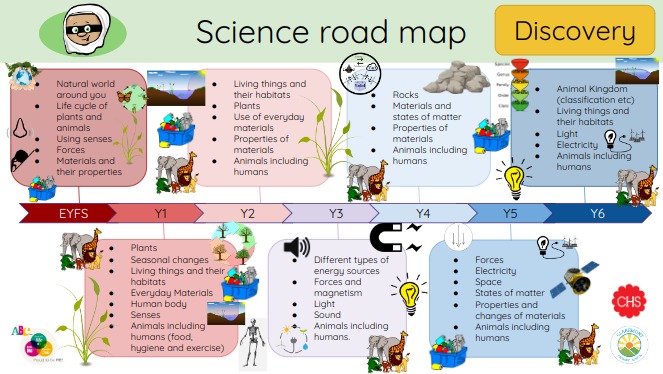
History
Intent
Our history curriculum is tailored to the interests and own experiences of our children at Claremont School, whilst ensuring that the national curriculum objectives for each year group are met. This enables children to deepen their understanding of the history of their local area as well as key places around the world. The golden thread underpinning our History curriculum is civilisation, with our intention being to encourage children to question, think critically and weigh evidence as they apply their skills and knowledge of how various civilizations and their key individuals have impacted our society today.
Implementation
Children are able to immerse themselves in our History topic across an entire half term and revisit their knowledge and skills throughout the year.
- A clear outline of the skills progression and key vocabulary identified for each year group ensures that pupils are building on and developing their historical skills each year.
- Inquiry lessons are planned at the beginning of each topic to ignite children’s curiosity about their new focus civilisation as well as to remind themselves of what skills and knowledge they have learnt in previous years.
- In KS1, History begins by looking at the children’s own personal history and introduces them to the idea of chronology and timelines.
- In KS2, children continue to develop their historical skills further by interpreting historical evidence and developing their critical thinking about the impact of different civilisations across history.
- In addition, historical skills are taught and developed across other Creative Me subjects throughout the school year to encourage cross-curricular learning.
- Themed days such as ‘Black History Day’ also encourage children to apply their historical skills to significant events and challenges that continue to be relevant in the modern world.
- Trips and workshops are organised throughout the year to give children the opportunity to apply their historical knowledge to the wider world.
Impact
Through our broad and balanced history curriculum, we aim for children to develop and strengthen their historical knowledge of chronology, comparison and critical thinking, as well as apply these skills to a range of civilizations and time periods as they progress throughout our school. Our off-curriculum days are designed to give children the opportunity to deepen their historical knowledge of key events and individuals and understand its significance to societal issues and challenges that we still face today. We aim for children to develop a passion and curiosity about key historical events and how they have impacted modern day society.
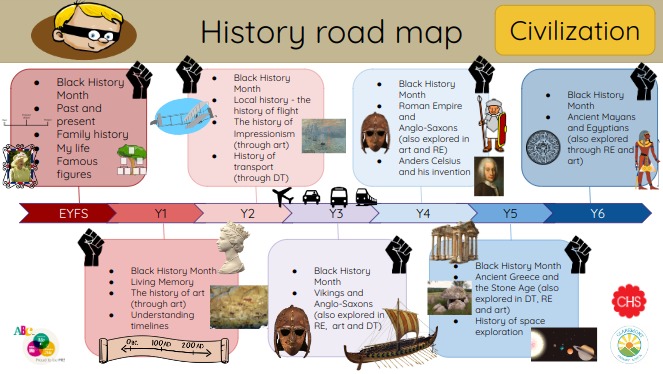
Geography
Intent
Our geography curriculum encourages children to develop a curiosity for the world around them, within their neighbourhood and beyond. The golden thread underpinning our Geography curriculum is Exploration and our aim is for children to develop a secure understanding of both physical and human geography across a diverse variety of locations.
Implementation
Our geography curriculum is delivered to each year group over the course of a half term in order to fully immerse the children in the subject. We have identified the key knowledge, skills and vocabulary required for each year group and consideration has been given to ensure progression across year groups. In addition to this, geography is linked to other Creative Me subjects throughout the school year to develop cross-curricular learning. At the beginning of each topic, inquiry lessons are planned to encourage children to revisit their previous knowledge from past geography topics and identify key questions and interests that they have about their current topic. This informs the programme of study and also ensures that lessons are relevant and take account of children’s different starting points.
Impact
Through our knowledge-rich geography curriculum, children will develop and strengthen their geographical understanding of location, physical processes and human interactions with the world, as well as apply these skills to a range of different regions as they progress throughout our school. We aim for children to develop an excitement and curiosity for key geographical concepts and apply their knowledge to a diverse range of countries around the world.
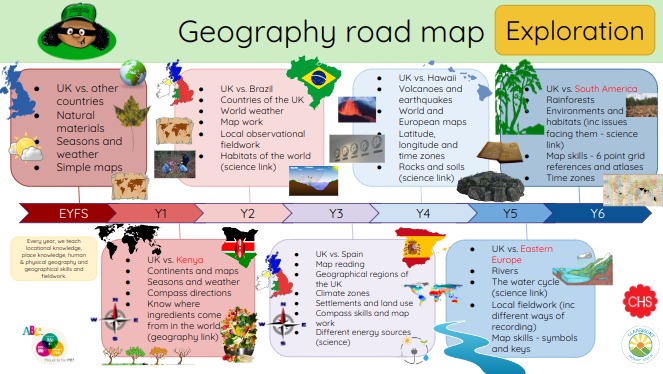
Religious Education (RE)
Intent
At Claremont Primary School, we believe that it is important for all our pupils to learn from and about religion, so that they can understand the world around them. Wouldn’t it be lovely if we could all live in harmony with each other? This is why we need Religious Education. It equips children with the knowledge, tolerance and respect needed to live peacefully alongside others and understand different views and experiences. As the citizens of the future, it is important that children see there is more than one way of life. The aim of Religious Education in our school is to help children to acquire and develop knowledge and understanding of the principal religions represented in Great Britain; to appreciate the way that religious beliefs shape life and behaviour, develop the ability to make reasoned and informed judgements about religious and moral issues and enhance their spiritual, moral, social and cultural development. Religious Education is taught throughout the school in such a way as to reflect the overall aims, values, and philosophy of the school, through topics such as Justice and Freedom and Heroes/ Heroines in everyday life. It plays an important role, along with all other curriculum areas, particularly PSHE, in promoting social awareness and understanding in our children. We encourage our pupils to ask questions about the world and to reflect on their own beliefs, values and experiences. We include and promote British values, ensuring that children are aware of their rights and responsibilities as UK citizens. Our curriculum is designed to encourage creativity, imagination, enquiry, debate, discussion and independence.
Implementation
We use the Agreed Syllabus for Religious Education as the basis for our curriculum. At Claremont Primary School, it has been agreed that having taken into account the requirements and guidelines presented in the Agreed Syllabus, the following religions have been selected for study: Christianity, Islam, Judaism, Hinduism, Buddhism and Sikhism.
We value the religions and beliefs of all the children, as well as the staff and this encourages them to share their own experiences freely and with confidence. As part of our Urban Adventure Curriculum, our children visit places of worship as well as meet local religious leaders. Children are able to handle artefacts and take part in a wide range of workshops which help develop their understanding of all the major religions. We are lucky to have a diverse school community which means we can learn so much from each other. We hold many community events and invite parents to take part and at times even run them. We try to acknowledge major festivals, particularly those celebrated by our school community, with assemblies and events. We think it is important for our children to be given these opportunities as it makes them inquisitive and confident to ask questions about the world around them. Our aim is to support children in developing their knowledge of different religions and understanding of different worldviews.
There are no presumptions made as to the religious backgrounds and beliefs and values of the children and the staff. We value the religious background of all members of the school community and hope that this will encourage individuals to share their own experiences with others freely. All religions and their communities are treated with respect and sensitivity and we value the links, which are, and can be made between home, school, and a faith community. We acknowledge that each religion studied can contribute to the education of all our pupils. We promote teaching in Religious Education that stresses open enquiry and first-hand experiences wherever possible for both staff and children.
Impact
The children at Claremont Primary School enjoy learning about other religions and why people choose, or choose not to follow a religion. Through their R.E. learning, the children are able to make links between their own lives and those of others in their community and in the wider world, developing an understanding of other people’s cultures and ways of life. As such, R.E. is invaluable in an ever changing and shrinking world.
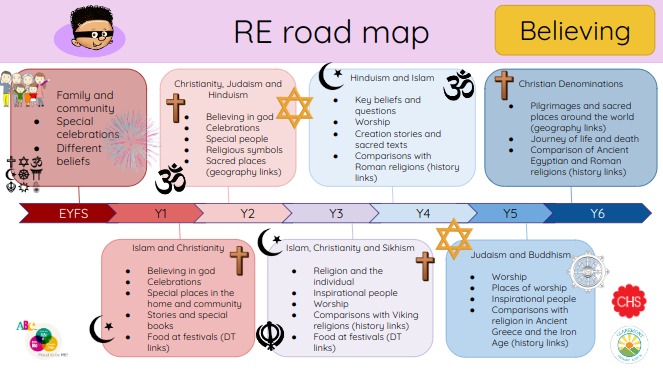
Computing
Intent
Throughout our time at Claremont, our children use a wide range of digital technology to support their learning and to help them become well-rounded digital citizens.
We want our pupils to leave school able to safely, confidently and competently use technology and ensure they are set up well for their future.
Implementation
Right through from our Early Years our children are exposed to different digital devices and software to support their educational and digital learning.
Both KS1 and KS2 follow the NCCE (National Centre for Computing Excellence) curriculum which is taught throughout the year, alongside an online safety lesson created by Common Sense Education every half term.
We have also heavily invested in technology for use throughout the school. As a Google school, both teachers and pupils use Chromebooks. In years 4-6 we are lucky enough to have 1:1 devices which the children use in class and at home to enhance and support their learning, through a project we call Wings Academy.
Impact
By building on their learning, and exposure to technology, throughout their years at primary school our children leave as fully rounded digital citizens. They are aware of the benefits and drawbacks of our digitally connected world and are able to navigate it safely and effectively. These skills help to set them up for success in their future education and careers.
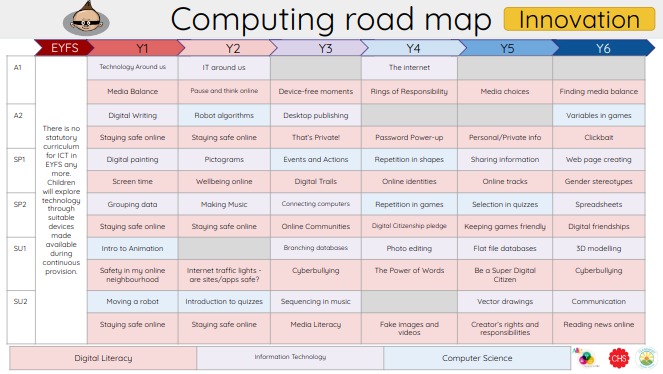
Art
Intent
Concept - Expression
At Claremont, we value the Arts as an integral part of the children’s education and cultural experiences. Arts embody some of the highest forms of human creativity. We intend to engage children with a high quality arts education which inspire and challenge pupils, equip them with the knowledge and skills to confidently express, experiment, invent and create their own works of art, in all forms. As they progress, they should also be able to think critically and reflect how arts have shaped our history and different cultures.
Implementation
As part of our Creative Me curriculum, we ensure that the Arts National Curriculum is implemented and delivered across key stages in an innovative way.
We provide our children with the opportunities to learn a wide range of art forms including visual art, music, drama and dance. Our visual art block starts with an inquiry lesson which aims to revisit prior learning and as a hook before we lead the children onto a new and exciting journey. Although visual art is taught as a primary subject in a fixed half term block, there are plenty of opportunities to teach art as a secondary subject in other areas, for example making clay diva lamps in RE. Performing arts including music, drama and dance are taught either weekly or when we have themed events.
Impact
Ongoing assessments including pupil voice and evidence in the pupils’ sketchbooks take place throughout the school year. Teachers use the outcome to inform future lesson plans. We ensure that our children are supported and challenged in all the tasks we set for them. We also monitor the high quality lessons delivered by carrying out learning walks and lesson drop-ins.
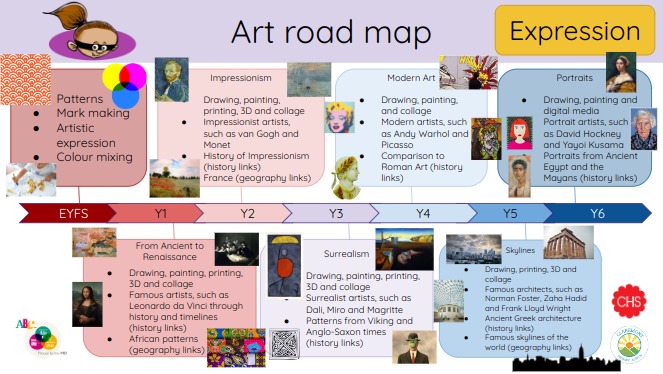
Design Technology (DT)
Intent
At Claremont we intend to build a Design Technology curriculum which puts our concept of creating at the front of the children's learning. We want our children to use their Creative Me side to design and make products that solve real and relevant problems within a variety of contexts, considering their own and others’ needs, wants and values. We intend for all children to acquire appropriate subject knowledge, skills and understanding as set out in the National Curriculum. We want Design and Technology to prepare our children, to give them the opportunities, responsibilities, and experiences they need to be successful in later life.
Implementation
Design and Technology is a crucial part of school life and learning and it is for this reason that as a school we are dedicated to the teaching and delivery of a high-quality Design and Technology curriculum.
This is implemented through:
- A well thought out, whole school, overview of the DT curriculum which allows for progression across year groups in all areas of DT.
- Well planned and resourced projects providing children with a hands-on and enriching experience.
- A range of skills being taught ensuring that children are aware of health and safety issues related to the tasks undertaken.
- Teachers are given ownership and flexibility to plan for Design and Technology; teaching DT as a block of lessons, 3 afternoons per week, across a term to allow the time needed for the children to be critical, inventive and reflective on their work.
- DT is included as a secondary subject in many other creative me topics to create cross-curricular links across the year.
- Pupils experience an inquiry lesson to kickstart the topic, revisiting prior learning and exploring our DT concept of creating.
Impact
Children will have clear enjoyment and confidence in Design and Technology that they will then apply to other areas of the curriculum. Through carefully planned and implemented learning activities the pupils develop the creative, technical and practical expertise needed to perform everyday tasks confidently and to participate successfully in an increasingly technological world. They gain a firm foundation of knowledge and skills to see them equipped to take on further learning in Secondary School. Pupil’s skills and knowledge are assessed ongoingly by the class teacher, throughout lessons. This informs the Design and Technology lead of any further areas for curriculum development, pupil support and/or training requirements for staff.
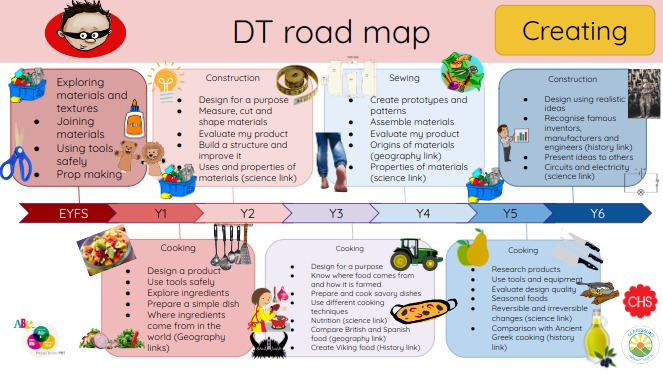
Physical Education (PE)
Intent
Claremont School believes that Physical Education is fundamental to a child's development. At Claremont we provide a safe and supportive environment which allows each and every child to develop emotionally and physically. Incorporated within this is the need for us to educate the children to attain good health and habits. We intend to deliver high-quality teaching and provide learning opportunities that not only inspire the children to succeed in physical education but also to develop transferable life skills. This includes teaching the children how to cooperate as part of a team, learning how to lead and educate them around subjects such as fairness and equality in sport which we hope will become life-long values. Part of this also is to teach life skills such as learning how to swim to keep them safe. Our curriculum aims to improve the wellbeing and fitness of all our children, not only through the sporting skills taught but also through the values and disciplines that Physical Education promotes.
Implementation
- PE at Claremont Primary School is taught by a number of PE Specialists who provide engaging and challenging lessons in a wide ranging curriculum.
- Lessons are taught on a variety of sports and activities including team games, net and wall games, bat and ball games, gymnastics, dance, outdoor education and swimming
Our long term planning sets out our PE units that ensure we meet the requirements of the National Curriculum
- Children participate in 2 hours of high quality PE each week. Examples include Year 4 attending Whitefield Academy for their PE lessons, Year 6 attending Hendon Leisure Centre plus Whitefield Academy and Year 5 learning to swim at Wessex Gardens swimming pool.
- Children have the opportunity to and are encouraged to participate in a wide range of extracurricular activities and sports clubs.
- Claremont have made links with a number of outside sports clubs in the local area so children can explore sporting opportunities outside of school.
- Each year the whole school takes part in Health, Fun and Fitness week. During this ‘themed’ week the children take part in numerous sporting activities including sports days and challenges. This brings our school community together with parents invited to take part.
- Wellbeing Wednesdays are a fundamental part of our school week. During the afternoon children get the opportunity to take part in a number of fun sports and activities.
- Competition is part of our PE Curriculum and all children get the opportunity to compete. Whether that is in our school sports days or representing our school in the various local competitions we attend.
- Claremont attends a Dance Festival every year run by the Elliot Foundation
Impact
Children will be equipped with an understanding of what the key components to a healthy lifestyle are and why sport is important to this. They will be motivated to take part in a variety of sports and equipped to participate in competitive sport. They will be ready to take part in PE in their secondary school and hopefully grow up to live healthy and happy lives utilising the skills and knowledge gained through PE.
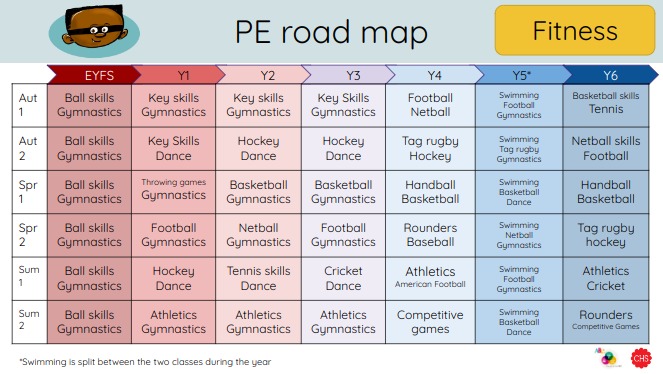
Being Me
Intent
We believe that our Being Me curriucum has the power to enhance the health and wellbeing of all children, their families and the whole school community. It has a positive influence on the ethos, learning and relationships throughout the school. It is central to our values and to achieving our school’s aims.
- Through quality delivery, our Being Me programme aims to develop:
- Confident individuals who know and understand how to live safe, happy, healthy, fulfilling lives;
- Young people who are able to maintain positive, respectful and healthy relationships, within which they can
- Thrive personally and socially;
- Responsible citizens who understand they have rights and responsibilities that help them make a positive
- Contribution to society; and
- Successful learners who enjoy overall learning, making progress and achieving success
Implementation
Our curriculum is a comprehensive framework which covers both the statutory elements of the DfE Guidance and the non-statutory elements of the Health Education Partnership Curriculum. Learning objectives are organised as a spiral curriculum, building on learning year on year, but it is intended to be used flexibly to meet the needs of our pupils and school community.
Impact
Our Being Me curriculum will lead to children meeting the standards of attainments across the school and those that are expected of our children nationally. Children will each make progress relative to their own individual starting point. The implementation and impact of the Being Me curriculum is assessed across school to ensure that children are provided with the best possible chance at succeeding. We strive to ensure that by the end of their time with us at Claremont each child will:
- Recognise and apply the British Values
- Be able to recognise, understand and manage their own emotions
- Understand who they can rely on and ask for support.
- Look after their own mental health and ask for support where necessary.
- Be on their way to maintaining a healthy lifestyle.
- Recognise differences and have an understanding of diversity.
- Apply learnt skills in real life situations
- Demonstrate self-confidence and self-esteem.
- Have developed and maintained healthy relationships with peers and adults.
- Understand the physical aspects involved in the teaching of RSE at the level appropriate to them as an individual.
- Show respect to themselves and others.
Our Being Me Curriculum is embedded within a range of secondary subjects such as PE, Science and the Arts.
